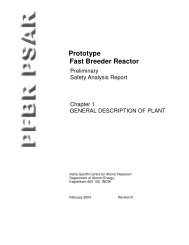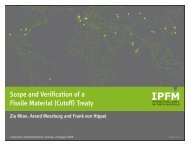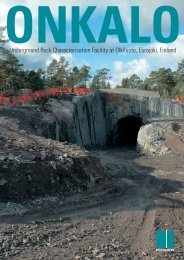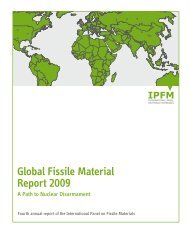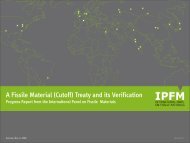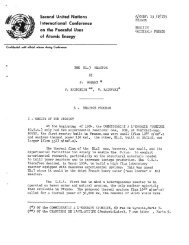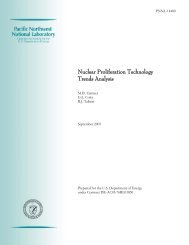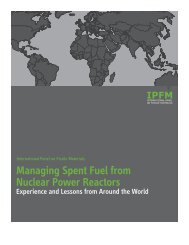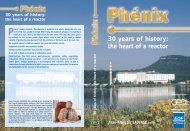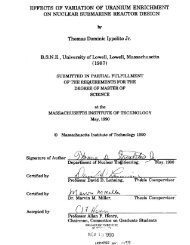Research Report No - International Panel on Fissile Materials
Research Report No - International Panel on Fissile Materials
Research Report No - International Panel on Fissile Materials
Create successful ePaper yourself
Turn your PDF publications into a flip-book with our unique Google optimized e-Paper software.
Foreword<br />
U.S. President George Bush and Indian Prime Minister Manmohan Singh have proposed<br />
that India have the right to import nuclear reactors and uranium for its nuclear power<br />
program. Since India is not a party to the Nuclear <str<strong>on</strong>g>No</str<strong>on</strong>g>nproliferati<strong>on</strong> Treaty (NPT), this<br />
would require an exempti<strong>on</strong> from both the rules of the Nuclear Suppliers Group of<br />
countries and the U.S. <str<strong>on</strong>g>No</str<strong>on</strong>g>nproliferati<strong>on</strong> Act of 1978. (The Nuclear Suppliers Group and<br />
<str<strong>on</strong>g>No</str<strong>on</strong>g>nproliferati<strong>on</strong> Act were both, in large part, resp<strong>on</strong>ses to India's use of a research<br />
reactor and reprocessing technology received under the Atoms for Peace Program to<br />
produce and separate the plut<strong>on</strong>ium for its 1974 nuclear-weap<strong>on</strong> test.)<br />
One of India's commitments under the Bush-Singh proposal would be to support a <strong>Fissile</strong><br />
Material Cutoff Treaty (FMCT) that would end producti<strong>on</strong> of plut<strong>on</strong>ium and highly<br />
enriched uranium for nuclear weap<strong>on</strong>s. Negotiati<strong>on</strong>s at the U.N. C<strong>on</strong>ference <strong>on</strong><br />
Disarmament in Geneva <strong>on</strong> an internati<strong>on</strong>al treaty have been blocked for the past decade,<br />
however, by disagreements over proposed linkages to discussi<strong>on</strong>s of other possible arms<br />
c<strong>on</strong>trol and disarmament treaties.<br />
In the interim, all five NPT nuclear weap<strong>on</strong> states (the United States, Russia, the United<br />
Kingdom, France and China) are believed to have stopped producing these materials for<br />
weap<strong>on</strong>s. But India has not joined this fissile-material producti<strong>on</strong> moratorium, and<br />
c<strong>on</strong>tinues to build up its stockpile of weap<strong>on</strong> materials. It has indicated that this would<br />
c<strong>on</strong>tinue until agreement <strong>on</strong> an FMCT is reached. That might take many years.<br />
Another c<strong>on</strong>cern about the Bush-Singh proposal is that it would allow India not <strong>on</strong>ly to<br />
c<strong>on</strong>tinue, but also to potentially accelerate the buildup of its stockpile of weap<strong>on</strong><br />
materials. Pakistan has indicated that it will expand its own producti<strong>on</strong> capability in<br />
resp<strong>on</strong>se.<br />
India’s producti<strong>on</strong> of weap<strong>on</strong> grade plut<strong>on</strong>ium is currently c<strong>on</strong>strained by the competing<br />
demands of India’s nuclear-power reactors for its limited domestic supply of natural<br />
uranium. If India could import fuel for its civilian nuclear reactors, it could use more<br />
domestic uranium for the producti<strong>on</strong> of weap<strong>on</strong> materials. India has exacerbated the<br />
c<strong>on</strong>cern that it might do so by placing eight of its heavy-water power reactors, the breeder<br />
reactor it has under c<strong>on</strong>structi<strong>on</strong>, its reprocessing facilities, and its stocks of previouslyproduced<br />
reactor-grade plut<strong>on</strong>ium outside internati<strong>on</strong>al safeguards.<br />
In this IPFM report, two Indian and two Pakistani IPFM members and researchers have<br />
carried out an assessment of how much weap<strong>on</strong> grade plut<strong>on</strong>ium India could produce<br />
using its unsafeguarded power reactors and breeder reactor. This assessment should be<br />
useful to the governments of India, the United States and the members of the Nuclear<br />
Suppliers Group, and to their publics, as they c<strong>on</strong>sider the proposed deal.<br />
José Goldemberg and Frank v<strong>on</strong> Hippel<br />
Co-Chairs, <str<strong>on</strong>g>Internati<strong>on</strong>al</str<strong>on</strong>g> <str<strong>on</strong>g>Panel</str<strong>on</strong>g> <strong>on</strong> <strong>Fissile</strong> <strong>Materials</strong><br />
2



